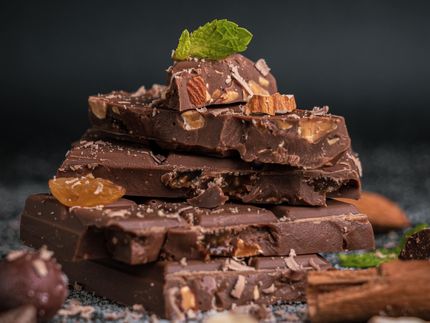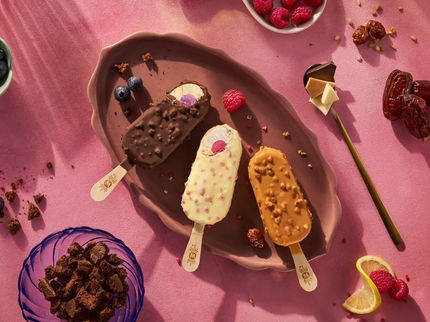Big scoop for vegan ice cream
Global plant-based ice cream new product development doubles in five years
Consumers around the world are going wild for plant-based innovation and ice cream is no exception. According to the latest research from Mintel Global New Product Database (GNPD), vegan ice cream accounts for an increasing proportion of global ice cream launches, making up7% of all launches in the last 12 months (2019/20), more than double the 3% five years ago (2015/16)*.

Unsplash
Within the sector, the focus on the textural qualities of plant-based ice cream is increasing; vegan ice creams with a chunky texture such as nuts, cookie pieces, toffee pieces and cookie dough chunks have surged from 2% to 13% of launches over the last four years (2016/17-2019/20)**. Adapting to this trend is likely to appeal to the 73% of UK ice cream consumers who said that they like ice cream with different textures (eg. crunchy, hard).
Chocolate (accounting for 26% of innovation over the last 12 months***), vanilla (11%) and coconut (9%) still remain the most popular in terms of plant-based flavour innovation.
This comes as 12% of UK adults agree that the coronavirus outbreak has made a vegan diet more appealing, almost doubling among under-25s (23%)****.
Kate Vlietstra, Mintel Global Food & Drink Analyst, said:
“The recent buzz around veganism has made its mark on the ice cream category. Interest in vegan ice cream isn't restricted to those following a vegan diet. Learning from their dairy counterparts, plant-based ice creams are moving beyond the basic flavours to offer indulgent options. Texture is playing a prominent part in vegan new product development (NPD) with chunkier varieties on offer. Brands are demonstrating that vegan offerings can be premium with an array of luxury flavour combinations and packaging.
“The makeup of plant-based ice cream will evolve, incorporating new ingredients from the world of plant milk such as quinoa and other seeds. Oats are expected to feature in more dairy-free ice creams, following on from the popularity of oats in plant-based drinks.”
Big in Japan: Japan scoops up number one position for ice cream NPD
From matcha to mayonnaise and seaweed to soybean, there seems no limit to Japanese ice cream innovation as Mintel reveals that Japan is now the world’s number one global ice cream innovator, commanding the highest share of ice cream launches.
Over the past five years, Japan’s ice cream innovation has gone from strength to strength. In 2015/16 Japan accounted for 7% of launches globally, but since then its innovation has been coming thick and fast and Japan is now (2019/20) responsible for a cool one in ten (10%) product launches, overtaking the US to become the world leader in ice cream innovation. Meanwhile, the US now (2019/20) accounts for 9% of new products launched, slipping back from its number one position.
With a 6% share of global ice cream innovation, Germany is Europe’s number one ice cream innovator and third in terms of global innovation, meanwhile the UK has a 4% share.
Kate Vlietstra, Mintel Global Food & Drink Analyst, said:
“A popular sweet treat among Japanese consumers, ice cream innovation in Japan has surged in recent years following a push to drive year-round consumption. Quirky flavours and exciting formats are putting Japanese ice cream at the forefront of food innovation, while providing ample inspiration for ice cream launches outside of Japan. The growing popularity of Japanese cuisine paves the way for ice cream brands to utilise traditional Japanese flavours such as hojicha and yuzu. Quirky combinations, unique flavours and unusual ice cream cones are all well-positioned to appeal to consumers globally.
“The postponed Tokyo 2020 Olympics, now due to take place in Summer 2021, offer a global platform on which Japanese-inspired food and drink can shine. Ice cream brands tapping into Japanese flavours are likely to fare well, particularly during the hot summer months.”
High added protein potential
Protein has gained importance with consumers; over the last five years, food and drink launches featuring high/added protein claims have doubled from 2% to 4% of total food and drink. Meanwhile, high/added protein ice cream claims have increased from under 1% of ice creams to over 2% in the last four years (2016/17 - 2019/20). While relatively small in number, the opportunity for ice cream with added protein is highlighted by the fact that around one in six British (16%) consumers would eat more ice cream if it had added protein.
Kate Vlietstra, Mintel Global Food & Drink Analyst, said:
“Ice cream is a treat food; a smaller amount of protein will satisfy the consumer demand for healthier options while allowing brands to explore different protein options. Plant protein from legumes, grain and seeds can offer a high-protein alternative to dairy protein. With sustainability ever the topic of discussion, the ice cream category will need to demonstrate its ethical credentials to continue to win favour with consumers, and plant proteins can appeal due to their lower carbon footprint than dairy proteins.”
_____
Mintel monitored new global product launches between:
*June 2015 - May 2016 - June 2019 - May 2020 ** June 2016 to May 2020 *** June 2019 to May 2020
**** Mintel commissioned research among 2,000 British internet users aged +16 between 23 April – 7 May 2020
































































